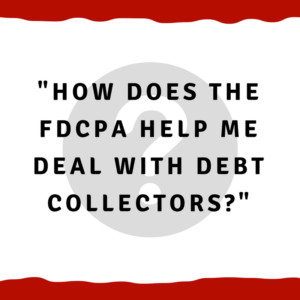How does the FDCPA help me deal with debt collectors?
“How does the FDCPA help me deal with debt collectors?”
 The FDCPA is the Fair Debt Collection Practices Act — a federal law that governs and regulates debt collectors.
The FDCPA is the Fair Debt Collection Practices Act — a federal law that governs and regulates debt collectors.
So, how does it help me if I’m dealing with debt collectors?
It protects you from abuse by debt collectors.
This is very important.
It does not say it’s illegal to collect debt, and there are some people who will put that out on the internet.
They’ll say, “Oh, it’s illegal for any debt collector to collect a debt.”
No. It’s okay, it’s legal for debt collectors to collect debt, as long as they do it in the right way.
The FDCPA says to debt collectors, “It’s fine to collect, but you must do it in a proper manner.”
It requires debt collectors to be truthful and to treat you fairly.
Now, there’s a whole bunch of different sections of it, but I’m just summarizing it into those two aspects.
They have to be truthful.
They have to treat you fairly.
If the debt collector lies about what the collector will do, that would violate the FDCPA.
For example, if a debt collector lies to you about a debt, says you owe $5,000 when really you owe $1,000, that would violate the FDCPA.
Another example would be if a debt collector says, “If you don’t pay me right now, then on Friday, I’m going to call your payroll department, send over a fax and I will garnish your wages.”
Well, except for very unusual circumstances, it would be a lie to say this as the debt collector needs a judgment against you before it can garnish.
That would be a lie.
The debt collector says, “I’m going to call the police or call immigration on you,” or “I’m going to …” do all these other things that are lies, that they have no intention of doing, that would violate the FDCPA.
Another example, and this would be unfair, is if they called your neighbors, called your co-workers, called your family.
Again, there’s very limited circumstance where they can do that.
It almost never comes up.
Instead, what we see these collectors do is they call your neighbors and they describe that as a “block party.”
They call your co-workers, and they describe that as an “office party.”
Then, they start calling family or ex-family, well that would be unfair.
Suing you after a statute of limitations expires would be unfair.
Putting false information on your credit report, that would be a lie and it would be unfair.
There’s a bunch of specific things that the FDCPA prohibits, but then it also talks in general terms about you cannot be abusive, you cannot be deceptive, you cannot be unfair.
All of that is designed to say to debt collectors, it’s okay to collect debt, but you have to do it in a proper and legal manner.
What happens if the FDCPA is violated?
Then, you sue that debt collector in federal court for money damages.
You also get your attorney’s fees paid, all sorts of benefits from it, but the money damages will be predominantly to compensate you for what you’ve gone through.
You can also get damages even if you haven’t been hurt, but normally, if the FDCPA is violated, you will be hurt by that.
It would be emotional distress.
It would be economic loss.
There’s usually some type of actual damage that has occurred.
What it also does is it encourages debt collectors to follow the law.
I’m going to say it slightly differently.
It discourages debt collectors from breaking the law.
Lots of good things happen when you sue the abusive debt collectors under the FDCPA.
My encouragement to you is discover your rights.
You’re doing that right now by watching this video or reading this article.
You want to keep discovering your rights and then make sure you take action.
That’s where you get real power.
Know what you’re supposed to do, and then you actually take action and do it.
That gives you real power.
Feel free to contact us.
If you have general questions, comments, feel free to put those in a comment below, or if you have specific questions or you’re unsure, maybe is a debt collector violating the law?
Is it not violating the law?
What should I do?
Give us a call. 205-879-2447 or you can contact us by filling out a form.
As long as you live in the state of Alabama, we’re more than happy to speak with you about any of your experiences with a debt collector.
Best Wishes.
[…] When debt collectors order block parties, they’re violating the FDCPA, or Fair Debt Collection Practices Act. […]